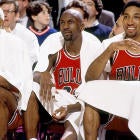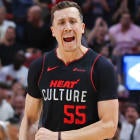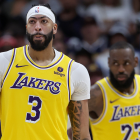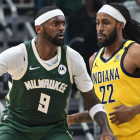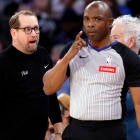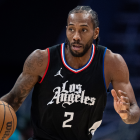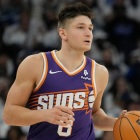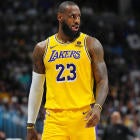"The Last Dance" -- ESPN's 10-part documentary chronicling the 1997-98 Chicago Bulls -- hit a high point on Sunday for a series that, as promised by director Jason Hehir, just keeps getting better. To be fair, every episode has been a home run. Ratings are through the roof. But Sunday's episodes hit from every angle on a range of topics that, in their own way, encapsulate everything Jordan and the Bulls represented.
Some good. Some bad.
Let's look at the winners and losers:
Winner: Michael Jordan
Episode 7 is, in my opinion, Jordan's finest hour of the series so far. He provides us with the most human moment we're likely to see as he's moved to tears talking about his take on leadership and the embers that stoked his maniacal motivation.
There's an old rule in writing that says "show, don't tell," and the "show" part of that rule is what we get in these episodes. For years we've been told stories about Jordan mentally, and sometimes physically, bludgeoning his teammates as he dragged them into his sphere of obsession, but here is the man behind the madness.
Why he was the way he was. What this all meant to him. As the seventh episode draws to a dramatic close, Jordan -- at the end of a leadership riff -- actually has to tell the director to "break" as he composes himself, and it does not feel like a product of fancy editing. It's amazing how much this all meant, and still means, to him.
I keep thinking about the scene of Jordan face down in the locker room after winning the 1996 title, cupping the ball tight, almost like a kid with his teddy bear, sobbing. I suppose it speaks to the difference between mortal people like me and the one percent of high-achievers in the world, but I never could understand how something like sports, winning some game or trophy, could mean that much to anyone. But it's not the victory, I've come realize, that taps into the deepest emotions. It's the loss that preceded it.
For Jordan, the loss of his father hits hard in these episodes. It touches on his foray into baseball, the sport to which his father introduced him. You might think his baseball career was kind of a punchline, but this dude, at 31 years old, hit .202 in Double-A after not playing baseball since he was 17 years old. Just pick up a bat and glove and rolled out with professionals.
"I can't believe that he actually hit .202, and he drove in 50 runs. We had a lot of good prospects that didn't drive in 50 runs," said Terry Francona, who managed Jordan with the Birmingham Barons. "In my opinion, with 1,500 at-bats, he would've found a way to get to the Major Leagues."
That's not just anyone saying that. That's a World Series-winning manager.
Loser: Scottie Pippen
Overall, Pippen has been a big winner in this documentary. The conversation of how under-appreciated he was, and continues to be, was reignited early. Dennis Rodman said Pippen was "the best player in the world" when Jordan went to play baseball, and when the beef between Pippen and Jerry Krause moved front and center, everyone took Pippen's side.
But what he did on May 13, 1994 was not a good look.
It was the second round of the playoffs, Chicago's first without Jordan, who had gone off to playoff baseball. With the Bulls trailing the Knicks 2-0 in the series and Game 3 tied 102-102 with 1.8 seconds to play, Phil Jackson drew up the last-second shot for Toni Kukoc, rather than Pippen, who was so incensed that he refused to go back in the game.
"We [didn't] know how to act," Steve Kerr recalled. "Scottie's one of our favorite teammates, one of our favorite people in the world. He quit on us. We couldn't believe that happened. It was devastating. ... The worst part was we knew that was not Scottie's character. We knew that wasn't him. And we knew that was going to be a stain on his reputation."
Jackson recalled Jordan calling after the Pippen incident and saying: "I don't know if [Scottie's] ever going to live this down."
So here's where it gets strange. In "The Last Dance," everyone talks about how bad Pippen felt after the game, how Bill Cartwright got up and gave an impassioned speech and Pippen apologized profusely, and even now, 25 years later, Pippen says in the documentary that "it's one of those incidents where I wish it never happened." But then he finishes by saying this:
"But if I had the chance to do it over again, I probably wouldn't change it."
Say what? You've had 25 years to think about full-out quitting on your team on account of your own ego, and still, after feeling terrible about it at the time, you would do the same thing again today? That is an awful look for Pip. Refusing to stand with your teammates is pretty much the bottom of the athlete barrel. I cannot make myself believe Pippen would actually do this again, but he's stubborn as heck and that's what he says in the doc, and it qualifies him as the biggest loser of Episode 7 in a landslide.
Winner: Scott Burrell
Burrell, basically a career backup, played nine pedestrian seasons in the NBA. One of those seasons, 1997-98, was with the Bulls, which just so happened to be the season a camera crew was following the team around. Burrell played 13 minutes per game that season, averaging five points and two rebounds. Almost nobody, before this series, would have been able to pick Scott Burrell out of a lineup. Even hardcore NBA fans had to scratch their head to remember his name.
Now, almost 20 years into retirement, he's trending on Twitter.
Such is life when you score a seat on the Jordan train, which, over the years, has transported many an obscure athlete into the brightest of spotlights. Burrell was introduced early in the documentary as the guy getting called out by M.J. on the team plane for his hard-partying ways. But in Episode 7, Burrell the actual basketball player becomes a prominent part of the story as one of Jordan's favorite whipping boys in practice.
"They just rode Scotty, and Scotty just smiled at Michael and took it, and fired right back at him," Jud Buechler says in the documentary.
Burrell wins in "The Last Dance" in more ways than just the world being alerted to the existence of an otherwise face in the NBA crowd. He just comes off as a chill dude. You can tell how much Jordan likes him, even if he shows it in a ruthless, big-brother way, and Burrell's willingness to not back down to the ultimate basketball bully shines a particularly admirable light on him.
"Scotty Burrell was a talented guy. What Scotty was lacking was a commitment of determination, seriousness, so he became my guy to kind of push, keep pushing, keep pushing," Jordan says. "I tried to get him to fight me a couple times, in a good sense, just to get him [to say], 'hey man, I'm tired of you picking on me.' That type of mentality. I could never get him [to do it]." Then Jordan smiles and says of Burrell: "He's such a nice guy."
Listen, any time Michael Jordan calls you a "talented" and "nice" guy, effectively giving you his stamp of approval as both an athlete and person, you are a big winner. End of story.
Winner: Toni Kukoc
As mentioned earlier, when Pippen refused to enter the game after Jackson designed the last second-shot for someone else to take, Kukoc was that player. And he made an incredibly difficult shot to win the game, a catch-and-shoot turnaround from just inside the 3-point line with a hand right in his face.
Kukoc has been a big winner throughout this series. Jordan and Pippen going at him mercilessly in the 1992 Olympics was a big story, but what really stood out was that, first off all, their wrath had nothing to do with Kukoc but rather Bulls GM Jerry Krause, and second, it didn't bury Kukoc. He came back in the gold medal game and acquitted himself quite well, and went on to have a very good NBA career, only a small part of which was this shot.
Winner: Gary Payton
Payton shows up at the end of Episode 8, and he'll be one of the biggest talking points in the coming week. A lot of people are going to laugh at him for suggesting he got the better of Jordan once he started defending him in the 1996 Finals. Heck, Jordan himself full on cracked up with child-like glee when he saw the Glove's comments.
"I had no problem with the Glove," Jordan said, still chuckling.
Nobody is saying Payton was on Jordan's level, but to suggest he had absolutely "no problem' with him is disingenuous. Payton started covering Jordan in Game 4 of the Finals, once the SuperSonics were already down 3-0, and in that first game Jordan went 6 for 19 from the field as Seattle won its first game of the series.
All told, Jordan shot 36 percent from the field in Games 4-6 as the Sonics climbed back into the series on the back of Payton's defense. Even in the clinching Game 6, Jordan was held to 22 points on 5 of 19 shooting.
"A lot of people backed down to Mike. I didn't," Payton said. "I made it a point, I said 'just tire him out. Tire the f--- out of him. And I kept hitting and banging him, and hitting him and banging him, and it took a toll on Mike. It took a toll. And the series changed. I wish I could've did it earlier. I don't know if the outcome would've been any different, but it was a difference me guarding him and beating him down a little bit."
So, why did it take until Game 4 for Payton to defend Jordan? Well ...
Loser: George Karl
Karl was a really good coach for a long time, and his logic for keeping Payton off Jordan for the first three games is reasonable.
"I had just won Defensive Player of the Year, but me and George had a meeting; he said, 'Look, I don't care about your defense right now. I need you to score,'" Payton recalled. "He didn't want to sacrifice me on both ends of the floor. But we got down [3-0]. I was mad. I said, 'F--- what you're talking about, George. I'm guarding him. You can't control this no more.'"
So Karl looks like the bad guy here, and certainly, with the benefit of hindsight, it looks like holding Payton off Jordan through the first three games was a mistake. Also, Payton's offense did not end up being negatively affected by the task of guarding Jordan. Over the first three games, Payton averaged 15 points per game. Over the last three games, when he was assigned to Jordan, he averaged 21 points per game.
This, apparently, wasn't the only mistake Karl made as it pertains to that series. As Ahmad Rashad tells it, the night before Game 1 he and Jordan were out to dinner. Karl, who has a relationship with Jordan stretching back to their North Carolina roots, was in the same restaurant, and in the sin of all sins, he didn't come over to say hello to Jordan.
"He walks right past me," Jordan recalled. "I said, 'Really, so that's how you're going to play it.' That's a crock of shit. We went to Carolina. We know Dean Smith, I see him in the summer, we play golf. You're going to do this? OK, fine. That's all I needed, for him to do that. It became personal."
Heaven forbid a coach, on the eve of a championship matchup, declines to make nice with the enemy, but this is Michael Jordan. As you'll read about shortly in the case of LaBradford Smith, this guy actually makes up fake slights, literally things that didn't even happen, to fuel his fire. If you actually give Jordan real fuel, forget about it.
Winner: LaBradford Smith
If you think Burrell was just another face in the NBA crowd, LaBradford Smith was hardly in the picture. He played three seasons for the all-but-invisible Washington Bullets and Sacramento Kings, averaging six points for his brief career. And now everyone's talking about him.
This story of Smith having the game of his life on March 19, 1993, scoring 37 points against the Bulls and in doing so drawing the ire of Jordan, is just hilarious. As the story went, after Smith had his moment in the sun, he went up to Jordan, put his arm around him and said, "Nice game, Mike."
Jordan, who didn't play well, of course took offense to this, and it just so happened the Bulls were playing the Bullets again the very next night in Washington.
"He said [on the plane], tomorrow, in the first half, I'm going to have what this kid had in the game," B.J. Armstrong recalls. "I've never seen a man go after another player the way he did."
So Jordan scores 36 in the first half, humiliates the kid, points at him, the Bulls win, and that's that.
Fast forward more than a decade later, and a rumor has surfaced that LaBradford Smith never did this, that he never put his arm around Jordan or even said anything to him. Jordan gets asked about it. Did this really happen? And he admits that it didn't, that he made the whole thing up just to light some deranged fire inside him to go out and kill this poor kid.
Absolutely amazing. The depths to which this man would go to work himself into an assassin's lather so he could win a basketball game is just hilariously awesome. And it feels, again, like LaBradford Smith is the butt of this particular joke.
But in reality he isn't. This guy had no NBA career to speak of, and yet on one night, he got the better of Michael Jordan to the point that the greatest player of all time had to lie to himself and everyone around him to go back at him. You get under Jordan's skin like that, you're a winner in my book.
Winner: Steve Kerr
The story of Steve Kerr having the stones to punch Michael Jordan during a practice skirmish has long lived in underdog lore, and it gets a rebirth in Episode 8. I loved when Kerr said: "I have a lot of patience as a human being, but I tend to snap at some point, because I'm extremely competitive too. I'm just not really good enough to back it up usually, but I'm going to fight."
When you look at Kerr through this lens, it's not hard to imagine why he's become such a successful coach. He's got the competitive side, but also the humility, the self-awareness and deprecation to say: "I'm not really good enough to back it up usually." That is a guy who is totally comfortable with himself.
That's big in coaching superstar players. Kerr has never had to try to be bigger than a Stephen Curry or a Kevin Durant or Klay Thompson. He will downplay his importance while fighting for his role at the same time. Superstars respond to an ego-less coach/role player who's not afraid to face the spotlight even while existing in the shadow.
"It was probably in a weird way the best thing that I ever did, was stand up for myself," Kerr said. "Because [Michael] tested everybody that he played with. And I stood up to him."
"He earned my respect," Jordan said. "He wasn't willing to back down and be a pawn in this whole process."
So, big shock here. Steve Kerr comes out a winner. Again. The guy has parlayed baseline NBA talent into eight championships. He played for the 72-win Bulls. He coaches the 73-win Warriors. And he punched Michael Jordan. Not a bad career, that's far from over.
Winner: 1995 Orlando Magic
When Jordan returned to basketball during the 1994-95 season after a year and a half of playing baseball, the Bulls met up with the Orlando Magic in the second round of the playoffs. After a tough Game 1 for Jordan, who had the ball stolen from him and threw a pass away in the final seconds as the Magic took a 1-0 series lead, Nick Anderson was quoted as saying Jordan "didn't look like the old Jordan" and that "No. 45 doesn't explode like No. 23 used to."
Jordan, of course, had come back wearing No. 45.
He went back to 23 the next game.
The way the story is portrayed, Anderson looks like the dummy who woke up the sleeping giant. But the thing is: he was right. Jordan wasn't the same player in 1995. He admitted he hadn't had time to round back into full basketball shape or rhythm, and the Magic won that series.
Anderson, in fact, was the guy who knocked the ball away from Jordan in the waning moments as Orlando went on to the NBA Finals -- where, of course, Anderson infamously missed four straight free throws with a chance to seal Game 1, which Orlando wound up losing in overtime en route to losing the series. But that's another story. As is the fact that Jordan and the Bulls came back to sweep the Magic in the conference finals the next season.
As it pertains to 1995, Anderson was right. He and the Magic went at the king, and they won. That is the only playoff series the Bulls lost from 1991-1998 with Michael Jordan on the floor. That was an awesome Magic team. Penny Hardaway. Shaquille O'Neal. Dennis Scott. The former Bull Horace Grant. Anderson. They never got a championship, but they got Jordan.













